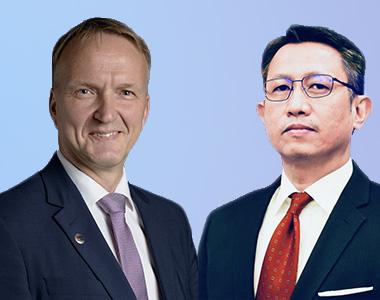Expert Voices
Science lessons from the pandemic

Following a year of omnipresent charts, life-saving innovations and the world’s fastest developed vaccine, is the world finally ready to listen to science? We asked the co-chairs of the 2021 Science, Technology and Innovation Forum: Permanent Representative of Latvia to the UN, Andrejs Pildegovičs, and Chargé d’Affaires of the Indonesian Mission to the UN, Mohammad Koba.
Science has been our strongest weapon against COVID-19. What have we learned from this pandemic?
Andrejs Pildegovičs: “The pandemic has clearly demonstrated that people need to be equipped with skills that help them navigate today’s complex information environment and make well-informed decisions.
Hopefully we have also learned that we must do better at not only listening, but also acting on science to avoid crises such as the COVID-19 pandemic in the first place. Science informs us of imminent threats and ways to prepare for them. Our policies and actions must heed it.”
Mohammad Koba: “I agree. The pandemic has taught us that policies which are not aligned with our scientific knowledge will be, sooner or later, cruelly verified by reality. Synergy between public policy and science will not only help us overcome the pandemic, but also lead to a sustainable recovery.
But the pandemic has also revealed a significant gap between the developed and the developing countries in their abilities, capacities and human resources to use science for addressing the pandemic. We need to mobilize support and strengthen international cooperation to help developing countries overcome this unprecedented crisis through science.”
How are science, technology, and innovation driving progress on sustainable development?
Mohammad Koba: “The digital technology is reshaping the world as we know it, offering developing countries a chance to leapfrog past the unsustainable models of old and straight into the digital world. For example, new technologies have fundamentally changed the way micro, small and medium enterprises (MSMEs) conduct their business and interact with customers. Through e‑commerce, and the expansion of digital economy, MSMEs are now one of the main driving forces for economic growth and poverty reduction in developing countries.”
Andrejs Pildegovičs: “Digital technologies are having the same effect on the public sector. Digitalization is improving the effectiveness, accountability and transparency of public institutions and promoting inclusivity and participation. For instance, in Latvia an NGO-run public participation platform ManaBalss.lv – or “My Voice” – allows citizens to submit and sign initiatives that can then be deliberated by the Latvian Parliament – an institution that is an example of innovation itself. The Saeima, as parliament is called in Latvia, was one of the first legislatures in the world to introduce a fully remote system of operation, including e-voting during the COVID-19 pandemic.
However, the potential of digitalization can only be truly unleashed if digital gaps in terms of connectivity and skills are properly addressed. These issues should remain high on the UN agenda.”
How can we expect the 2021 Science Technology and Innovation Forum to push the needle?
Andrejs Pildegovičs: “This STI Forum should bring together stakeholders from all parts of the world and contribute to the cross-fertilization of ideas, networking, sharing of best practices and solutions for achieving the Sustainable Development Goals. We need to bring together everyone, from innovators, private sector and academia, to major international organizations, civil society, women and youth. Only together, can we ensure that science, technology and innovation deliver for sustainable development in this Decade of Action.”
Mohammad Koba: “The STI Forum is unique precisely because it brings together such a diversity of stakeholders. Only here, so many regulators, policy-makers and businesspeople rub shoulders with innovators, scholars and activists. All these players have the power to bring scientific innovation up to scale and advance sustainable development. I believe, this is the place where we can push our common agenda forward, particularly on strengthening international cooperation and increasing multi-stakeholder involvement – especially from the private sector.
Closing the scientific and innovation gap between developed and developing countries needs to be our top priority. To achieve that, we need strong political will, commitment and support, not only from the developed countries, but also international organizations and institutions, as well as the private sector.”
Visit the website of the 2021 Science, Technology and Innovation Forum to learn more.
 Welcome to the United Nations
Welcome to the United Nations